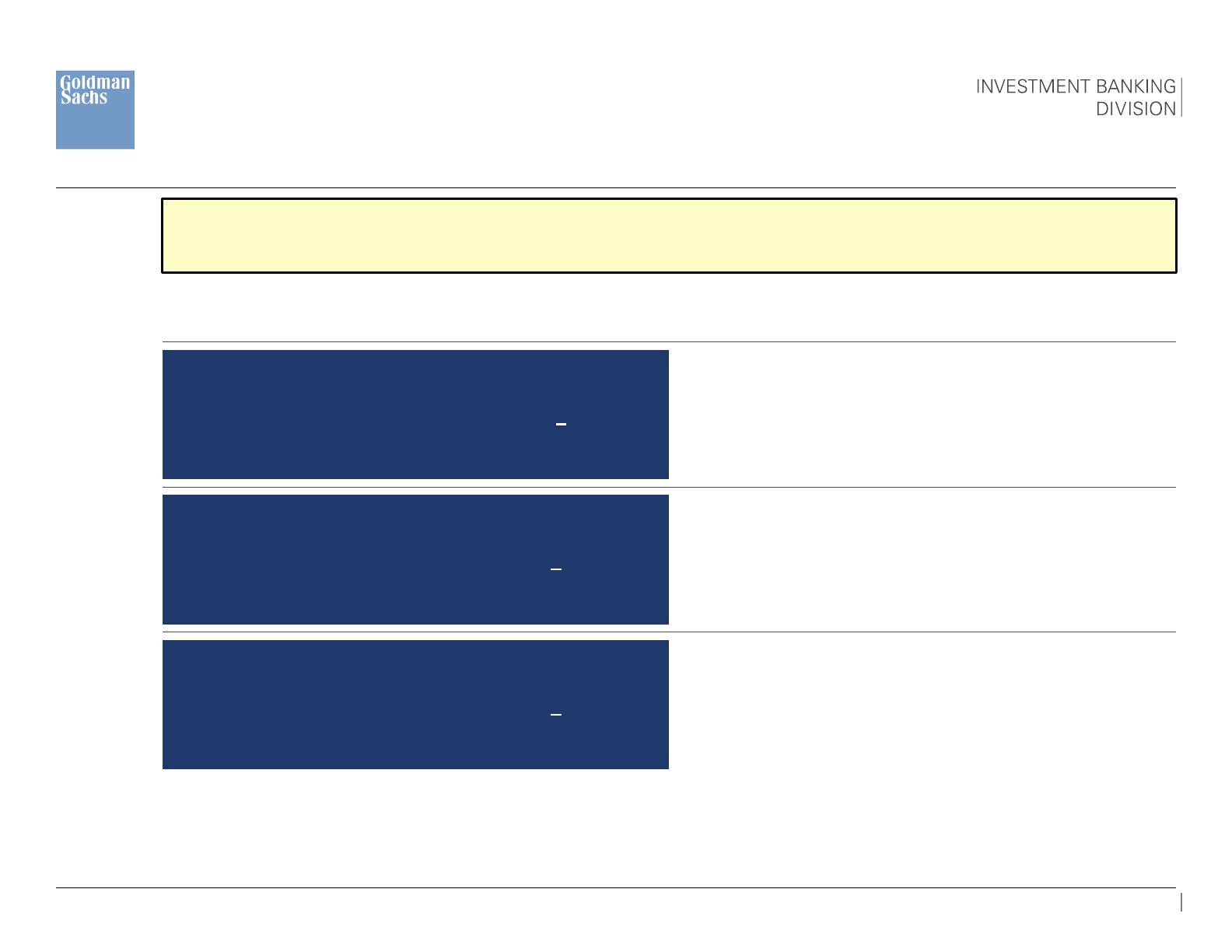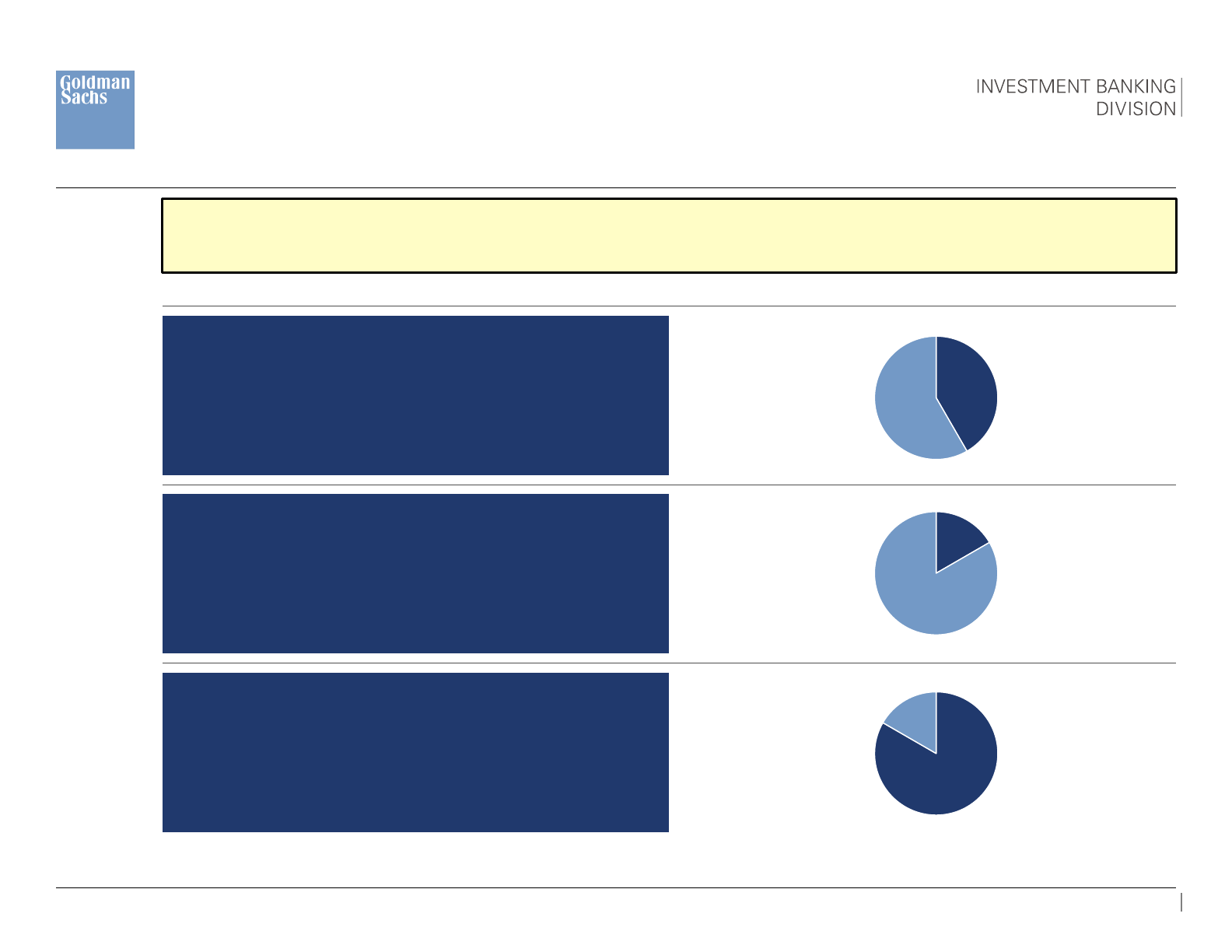
Working Conditions Survey
Goldman Sachs & Co. LLC
February 2021
Goldman Sachs does not provide accounting, tax, or legal advice. Notwithstanding anything in this document to the contrary, and except as required to enable
compliance with applicable securities law, you (and each of your employees, representatives, and other agents) may disclose to any and all persons the US federal
income and state tax treatment and tax structure of the transaction and all materials of any kind (including tax opinions and other tax analyses) that are provided to
you relating to such tax treatment and tax structure, without Goldman Sachs imposing any limitation of any kind.

2
Hours Worked
Source: Survey of first-year analysts, 13 respondents
Question Mean
How many hours have
How many hours have you worked this week (ending
2.13.21)?
105 hours
How many hours have you worked per week on average
since January?
98 hours
How many hours do you sleep on average per night? 5 hours
hours
On average, what time do you sleep? 3am
On average, first year analysts are working over 95 hours per week and sleeping 5 hours per night

3
Near Term Retention
Source: Survey of first-year analysts, 13 respondents
Question Mean
How many hours have
If working conditions stay the same, what is the
likelihood you’ll still be working at GS in 1 month?
(1-10, with 10 being most likely)
8.1
If working conditions stay the same, what is the
likelihood you’ll still be working at GS in 3 months?
(1-10, with 10 being most likely)
5.2
If working conditions stay the same, what is the
likelihood you’ll still be working at GS in 6 months?
(1-10, with 10 being most likely)
3.5
If working conditions do not change in the next 6 months, most 1
st
year analysts say they are unlikely to stay at
GS

4
Effect on Physical and Mental Health
Source: Survey of first-year analysts, 13 respondents
Question Mean
How many hours have
Rate your mental health before and after starting this
job
(1-10, with 10 being healthiest)
Rate your physical health before and after starting this
job
(1-10, with 10 being healthiest)
8.8
2.8
Before After
9.0
2.3
Before After
1
st
year analysts report that the stresses of work have been detrimental to both their mental and physical health

5
Analyst Treatment (1 / 3)
Source: Survey of first-year analysts, 13 respondents
Question Percent
How many hours have
Have your work hours negatively impacted
relationships with family and/or friends?
Do you feel like you’ve been a victim of workplace
abuse?
Have you sought or considered seeking counseling,
therapy or any additional services for your mental
health due to the stress of this job?
Yes
100%
No
0%
Yes
77%
No
23%
Yes
75%
No
25%
All respondents feel as though work hours have negatively impacted their relationships with friends and/or
family. The majority of 1
st
year analysts feel they have been the victim of workplace abuse and have or
considered seeking help due to deteriorating mental health

6
Analyst Treatment (2 / 3)
Source: Survey of first-year analysts, 13 respondents
Question Percent
How many hours have
Have you frequently experienced:
Unrealistic Deadlines
Have you frequently experienced:
Shunned / Ignored in Meetings
Have you frequently experienced:
Unwarranted, Invalid or Public Criticism
Yes
100%
No
0%
Yes
92%
No
8%
Yes
50%
No
50%
All respondents have experienced unrealistic deadlines and a large majority have been ignored in meetings
that they worked hard to prepare for

7
Analyst Treatment (3 / 3)
Source: Survey of first-year analysts, 13 respondents
Question Percent
How many hours have
Have you frequently experienced:
Blaming without Justification
Have you frequently experienced:
Shouting or Swearing
Have you frequently experienced:
Excessive Monitoring or Micromanagement
Yes
42%
No
58%
Yes
17%
No
83%
Yes
83%
No
17%
Some analysts have been shouted at and/or sworn at

8
Analyst Satisfaction
Source: Survey of first-year analysts, 13 respondents
Question Median
How many hours have
How satisfied are you with this firm?
(1-10, with 10 being very satisfied)
2.0
How satisfied are you with your work life?
(1-10, with 10 being very satisfied)
2.0
How satisfied are you with your personal life?
(1-10, with 10 being very satisfied)
1.0
On average, 1
st
year analysts are very unsatisfied with the firm, work life, and as a result our personal lives

9
Possible Impact to GS
Source: Survey of first-year analysts, 13 respondents
Question Mean
How many hours have
If you were to move on to another finance-
related role,
how likely would you recommend your team work with
Goldman Sachs?
(1-10, with 10 being most likely)
5.4
How likely are you to actively recommend against using
GS as a financial advisor should you have the capacity
to do so?
(1-10, with 10 being most likely)
3.8
How likely are you to recommend GS as a place to work
to aspiring talent?
(1-10, with 10 being most likely)
4.2
On average, 1
st
year analysts are unlikely to recommend GS as a place to work

10
Select Analyst Quotes
“Being unemployed is less frightening to me than what my body might succumb to if I keep up this lifestyle”
“I can’t sleep anymore because my anxiety levels are through the roof”
“The sleep deprivation, the treatment by senior bankers, the mental and physical stress…I’ve been
through foster care and this is arguably worse”
“My body physically hurts all the time and mentally I’m in a really dark place”
“I didn’t come into this job expecting a 9am-5pm’s, but I also didn’t expect consistent 9am-5am’s either”
“There was a point where I was not eating, showering or doing anything else other than working from morning
until after midnight”
“What is not ok to me is 110-120 hours over the course of a week! The math is simple, that leaves 4 hours a day
for eating, sleeping, showering, bathroom and general transition time. This is beyond the level of ‘hard-working’, this
Is inhumane / abuse”

11
Rectifying the Situation
80 hours per week should be considered max capacity
— In order to do our best work and deliver for the firm’s clients we need to be rested and free from juggling an insurmountable
amount of conflicting work streams
CS work should be appropriately de-prioritized versus live deal work
— Although CS work is important, completing CS work should not come at the detriment of live deals
— CS work should not be completed after an appropriate time of night (midnight) so that analysts can get sleep when they are
not working on something that is not truly urgent
Client meetings requiring materials should be scheduled at least 1 week in advance of the meeting date
— In order to avoid unnecessary time crunches teams need ample time to prepare for meetings
— Doing so should lighten stress levels and give teams time to be thoughtful and produce their best materials
Teams should be required to meet ASAP when a meeting is set to align on content, timing, and capacity
— Often times, VPs create shells for decks that do not align with what senior team members want to show, which results in
junior teams creating the wrong materials. Ultimately, senior team members see these materials and junior team members
often have to start from scratch on incredibly short timelines (less than 24 hours) – resulting in unnecessary stress, subpar
work, and lack of sleep
For client meetings, teams should be pencils down 12 hours before the meeting
— Junior team members often receive many comments right before meetings with the assumption that they can incorporate
comments at a moment's notice. This adds undue stress and is unreasonable as senior folks are essentially asking them to
put everything else to the side immediately, when instead these comments could have been given and addressed at a more
reasonable time
The Friday night 9pm policy, and Saturday policy need to be respected
— Junior bankers should not be expected to do any work after 9pm Friday or all day Saturday without a pre-approved
exception, as that is the only safe-guarded personal time that we get
— Often times, junior people are asked to do “quick” work without an exception and it is incredibly hard to push back
